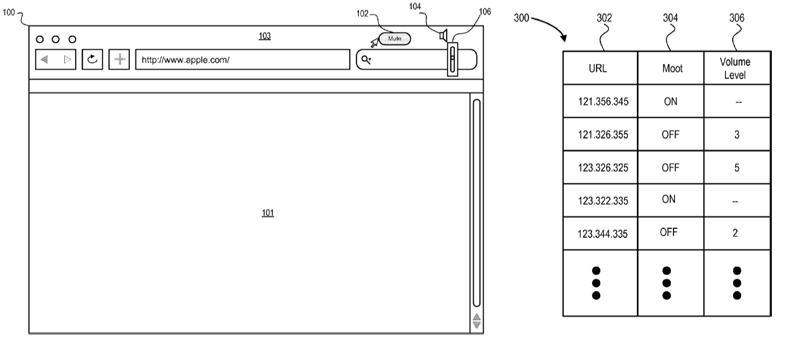Apple may give Safari audio controls to silence irritating websites
A filing published this week shows the Cupertino-based company to be exploring the possibility of adding advanced audio preferences to Safari that will allow users to silence audio signals from some or all websites without interfering with welcomed audio playback coming from other applications running on their Mac or PC.
"When a user browses [a website], various audio signals may be presented in the browser application. These audio signals can be music, advertising jingles, noises, sound effects, speech, etc," Apple explains. "Concurrently, the user may be listening to music from the user's personal music library. In some cases, audio signals from audio sources may interfere with the listening enjoyment of the user."
While the Mac OS and Windows operating systems already provide users with audio controls, those audio controls adjust all audio signals playing on a computer at once, thereby affecting desired audio playback at the same time as undesirable playback, which may not be the intent of the user.
To address this issue, Apple proposes the addition of mute and volume controls tailored specifically for controlling audio playback coming from web sources. With these controls, users could mute or adjust the volume of audio coming from all websites. Alternatively, rules could be set and maintained for handling audio from websites on an individual basis.
"In some implementations, if an audio source is encountered for the first time in a browser application, then audio control settings specified by the user for controlling a audio signal from the audio source can be stored in a [database]," Apple says. "Once stored, the user specified audio control settings can be recalled and applied to the audio controls when the audio source is encountered in another session by the browser application."
A specialized audio preference pane could further fine tune the experience, allowing users to specify the URLs of websites (such as "www.myspace.com") from which it does not want to receive audio playback. In other cases, users could specify that volume levels for audio signals from a specified audio source be automatically adjusted over time until the audio signal becomes audible. Alternatively, users could specify that audio signals from a specified audio source be muted or adjusted only if another application is running.
"For example, the process can determine if a media player is playing music, videos or other content," the filing says. "If a media player is playing music, videos or other content, then the audio controls of the browser application can be enabled. Otherwise, the audio controls of the browser application can be disabled."
Apple goes on in the 9-page filing to explain that such a version of Safari could "run on any device capable of hosting a browser application, including but not limited to: media players, mobile phones, smart phones, email devices, game consoles or devices, personal computers, personal digital assistants, etc."
Preferences set on a traditional Mac or PC could also be stored in a data structure of a network storage device for downloading by the user on other devices such as their iPhones or iPod touches.
 Sam Oliver
Sam Oliver











 Wesley Hilliard
Wesley Hilliard
 Andrew Orr
Andrew Orr



 Amber Neely
Amber Neely

 William Gallagher
William Gallagher







